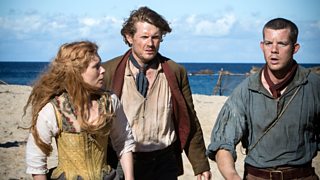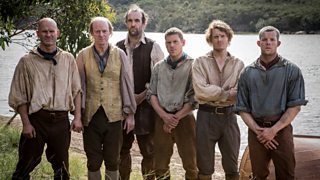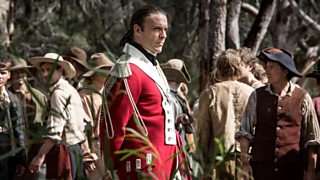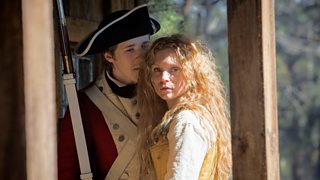Banished - a new drama for BBC Two set during the founding of the penal colony in Australia in 1788.
Jimmy McGovern
Writer

Banished: Myanna Buring as Elizabeth Quinn, Julian Rhind-Tutt as Tommy Barrett and Russell Tovey as James Freeman (BBC/RSJ Films, Photographer: Mark Rogers)
You originally developed a film around the plight of the first convicts in New South Wales. How much of that formed the story of Banished? And how easy was it to transfer that film script to a TV drama?
Yeah, I wrote the film with an Aussie writer called Mac Gudgeon. It was about the first few years of the penal colony. I told the story from the convicts' perspective and Mac told it from the aboriginal people's point of view. Jane Tranter was in charge then and she told me she'd almost certainly do it "in a year or two" and then, of course, she went off to America. But I carried the story around with me and then, when Roxy, Sita and I were casting around for ideas for something new, I told them the story of Australia's first hangman, one of the best stories I have ever come across.
We added a couple more stories and took the whole thing to Ben Stephenson. He commissioned it and I started writing. I'd written about three episodes when it dawned on me that we still hadn't had the green light from the channel controller (Janice Hadlow it was then) and by the time it came I'd written four episodes without a contract. But I'm glad I did because if I'd stopped, the energy level would have dipped. I have to say that throughout this period of "development hell" Polly Hill, head of independent drama, was a rock. Without her, there would be no 'Banished'.
Incidentally I never wrote a storyline. I had characters in there and I didn't have a clue what they were doing there. And I had fragments of story that went absolutely nowhere. But I just kept on writing and writing and hoping that I'd discover what the characters were doing, how they affected the story, and praying that those fragments would grow into something more substantial. And they did. I wrote it in the way you'd write a huge 19th century novel. And I think that's the way I'm always going to work in future. Too many story lines are ill conceived and hastily written. Far better surely to explore and find your characters as you go along - and your stories.
Many of the characters actually existed but, apart from that, it is fiction. One of the convicts, for example, is portrayed as a noble, heroic individual whereas, in reality, he was almost certainly a weak petty thief. I've taken liberties similar to those taken by the makers of, say, Deadwood or any other western. It is not a drama-doc (where accuracy is essential). It is fiction. It is entertainment.

Sprag (Nick Moss), Letters Molloy (Ned Dennehy), Marston (Rory McCann), Stubbins (David Walmsley), Tommy Barrett (Julian Rhind Tutt), James Freeman (Russell Tovey) (BBC/RSJ Films/Mark Rogers)
The series is set to feature internationally in both Australia and New Zealand as it was a co-commission with BBC Worldwide Australia. Did your knowledge of this international audience alter the way you wrote at all?
No. I wrote it in the way I write everything else: I wrote it for me. If you set out to write something with "universal appeal" it is doomed. James Joyce wrote about Dublin and, in writing about Dublin, he wrote about the world.
How has the TV drama landscape changed for writers during your career?
The landscape has changed massively. When I was starting out, Brookside was starting out and that was a show that would take risks with people. Phil Redmond would take people on simply because they showed promise. He would let you learn on the job. And, believe me, there is no better way of learning than seeing your name go up on a television screen after half an hour of utter crap. You cringe. You squirm. You don't leave the house for days. And you resolve to do better next time. But nothing like that would happen today. To get a chance on the soaps nowadays you have to be able to do it right now. Also there is hardly any single drama these days. I left Brookie in 1989 and I was able to write three single dramas for the Screen One strand and for the Screenplay strand on BBC Two. Nothing like that exists anymore. Paul (Abbott) tried to reintroduce it via the back door with Clocking Off and I followed Paul with The Street and Accused but, still, such opportunities are few and far between.

Major Ross (Joseph Millson)(Photo: BBC/RSJ Films/Mark Rogers)
What are you working on now? What stories would you like to tell?
I'm writing the story of Reg Keys. He's the man who lost his son in the Iraq War and then took on Tony Blair in Sedgefield, Blair's constituency. But we don't have the green light for it yet. And I've just started work on series 2 of 'Banished' but, again, we don't have the green light for that either. I hate starting things. To write "page 1" and know you've got another ninety to go - it makes me ill.
What advice would you give to someone starting out now?
Work hard. At 'Brookside' I got a bit of a reputation. There were actors there who would ask for me to write certain episodes and directors who would do the same. And it wasn't because I was better than the others. I wasn't. I was still learning. But, by God, nobody worked harder than I. I worked my socks off there, morning noon and night.

Private Buckley (Adam Nagaitis), Elizabeth Quinn (Myanna Buring) (Photo: BBC/RSJ Films/Mark Rogers)
Banished begins on BBC Two on Thursday 5 March 2015 at 9pm and on BBC iPlayer for 30 days after broadcast
Find out more about the Cast & Characters
Jimmy McGovern in Conversation - download this free podcast from the BBC Academy
